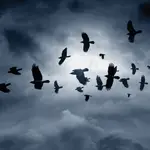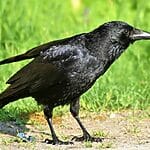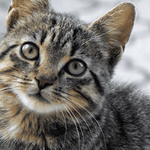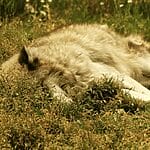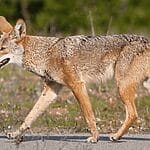When it comes to birds, ravens are among those with a bit of a bad reputation.
When alone, a raven is a raven, but when in a group, they are referred to as an unkindness of ravens.
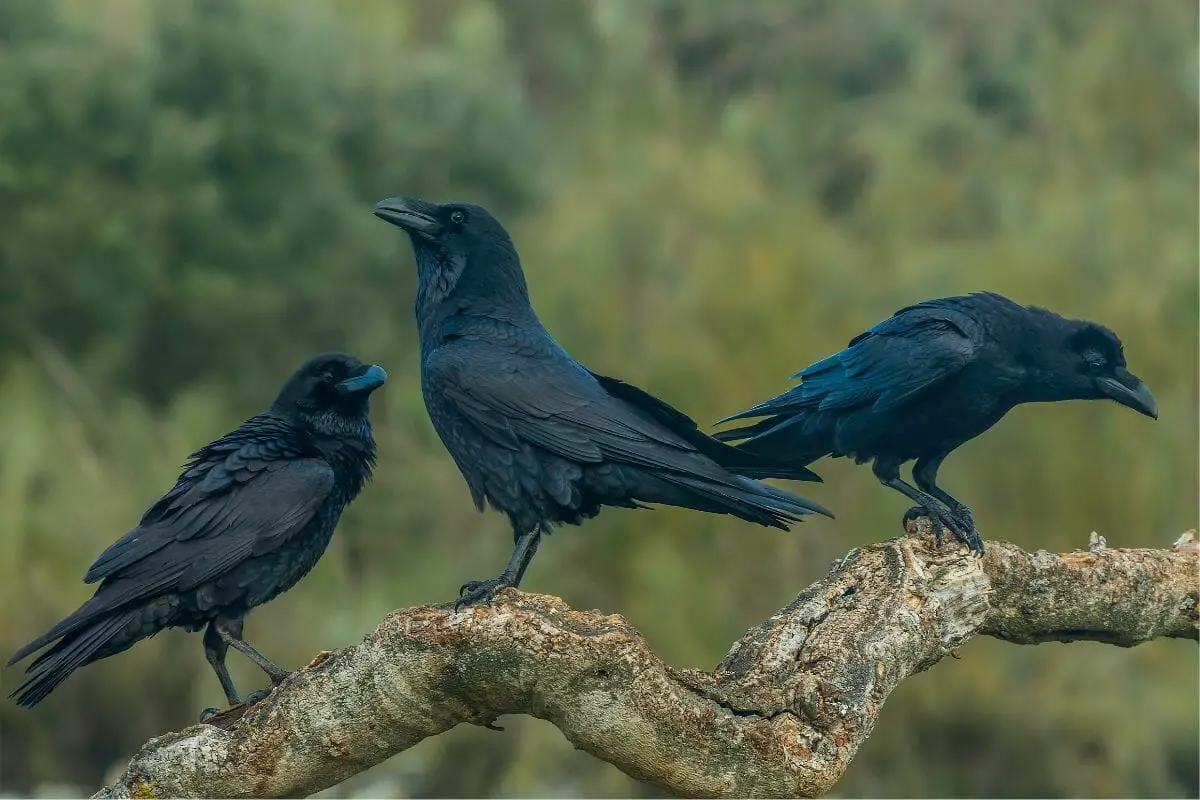
In this article, we will discuss the origins of this name and whether or not it is justified.
So, if you’re interested, read on for more!
What Are Some Collective Nouns For A Group Of Ravens?
Before we explore why a group of ravens is known as an unkindness, let’s look into the other collective nouns for them.
Other names for a group of ravens are:
- A rave of ravens
- A flock of ravens
Seems normal enough, right? However, there are also these:
- A conspiracy of ravens
- Treachery of ravens
…Not so good.
Why Is A Group Of Ravens Called An Unkindness?
Let’s check out the potential reasons behind why a group of ravens is called an unkindness below!
19th Century Beliefs
It is thought that a group of ravens is called an unkindness because, during the 19th century, it was widely believed that they did not care about their young.
Sometimes, ravens would place their young into the world before they were ready, leading many of them to die. Many people concluded that this was cruel, callous behavior.
Some even called it unkind, hence, an unkindness of ravens.
Of course, this belief stems from a misunderstanding of ravens and how they work within nature.
The Representation Of Ravens In Mythology
Over the years, ravens have gained a pretty bad reputation.
In many myths and legends, ravens are associated with bad fortune, and gained a reputation for being sly, sneaky tricksters.
This may also be a contributing factor as to why they are called an unkindness.
After all, this is a bad reputation that seems to have stuck and has even developed.
Perhaps the most popular depiction of a raven in literature is the raven in the poem The Raven, by Edgar Allen Poe.
The most popular analysis of the raven in this poem is that it is symbolic of death.
The raven enters the narrator’s room and is an overbearing presence for him, constantly repeating the same word over and over: nevermore – a sign that it will provide the narrator with no peace.
The raven in the poem arrives at a time of grief for the narrator, thus its repetitive nature reminds him of the unhappy truth of life and grief – that he will never see his lost love again.
It’s pretty dark, right? Not a good day for ravens.
Why Do Ravens Have Such A Bad Reputation?
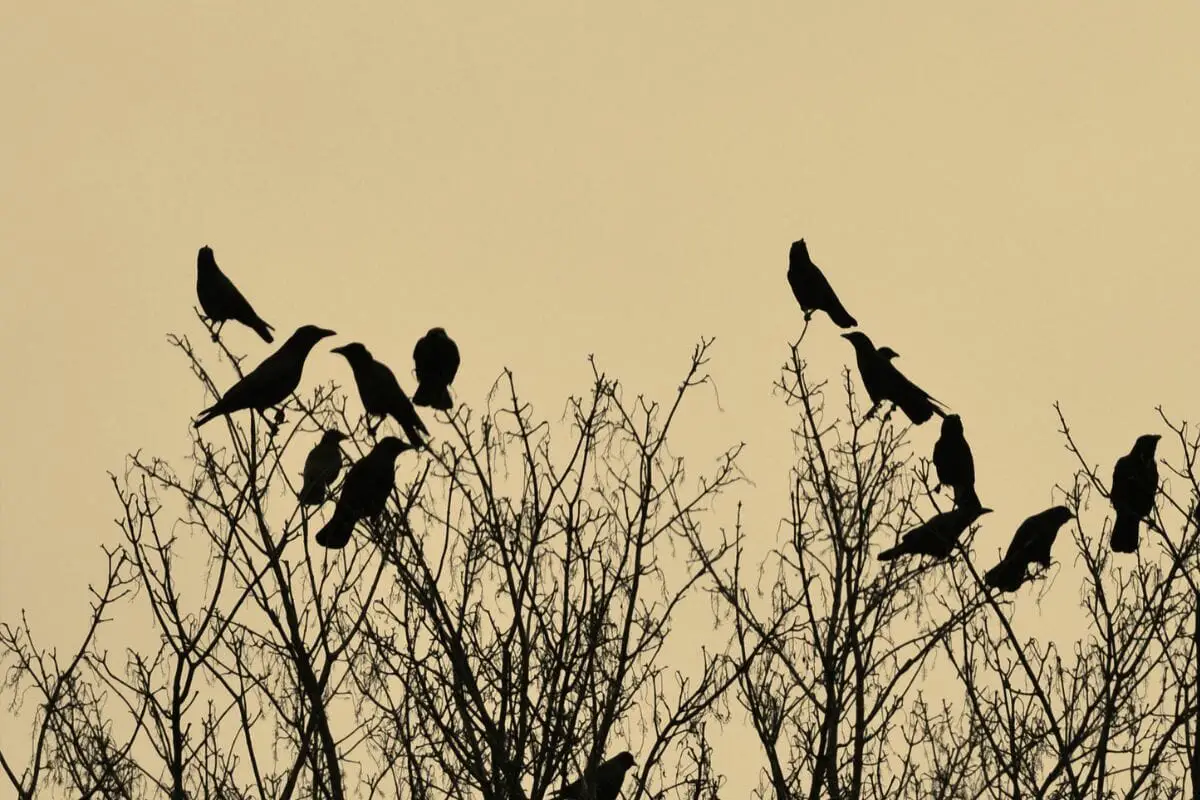
Ravens have gained a bad reputation for many reasons. Let’s check them out in more detail below!
The Raven’s Appearance
Primarily, they are associated with dark things, such as death. This is because people believe that their eyes look like they are watching and following you wherever you go.
The Raven’s Link To Dead Creatures
Another reason why ravens have a bad reputation is that they always seem to be found close to dead things.
However, this is less because they are connected to death in a spiritual sense, and more because ravens are scavengers which means they like to seek out any opportunity they can to get food.
The Raven’s Aggressiveness
Ravens have a bad reputation because they are known to be aggressive when it comes to their food.
Sometimes, they will even attack other animals and humans if they feel their food is threatened in any way.
The Raven’s Link To Halloween
Because of their link to death and dark things, ravens are now heavily associated with Halloween.
Then, because they are associated with Halloween, people view them as linked to all things dark and death. It’s a very vicious cycle.
The Raven’s Intelligence
Ravens are very intelligent creatures, especially compared to other birds. This is because their brains are very big compared to their size.
Because they are so intelligent, ravens are prone to hiding food, mimicking human voices, and communicating secretly with other ravens about what is going on in the world around them.
Final Thoughts
A group of ravens is known as an unkindness based on many reasons. In the 19th century, there was a misunderstanding about the way they treat their young which led to the unfortunate collective noun.
Ravens are also considered to be omens of bad luck, often representing death and darkness in media. They have come to be associated with holidays like Halloween because of this.
The raven is also considered to be an intelligent, aggressive bird, which may intimidate humans and contribute to their unfortunate group name.
The collective term “unkindness” for ravens surprisingly contrasts their intriguing nature. Often likened to crows in a “murder of crows,” ravens gather differently, symbolizing wisdom and intelligence. Their reputation as tricksters emerges from their corvid lineage. In pairs, they explore, find food, and symbolize deeper meanings, revered by cultures—often intertwined with the mystical, like in witch lore.
Their distinction from other bird species, like finches, lies in their distinct genus, showcasing the nuanced diversity within avian families. Understanding the unique dynamics within this fascinating species unveils their complexity beyond the peculiar name bestowed upon them.
But what do you think? Is the name for a group of ravens justified? Or should they be called an unkindness nevermore?

